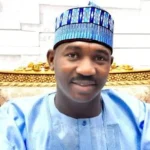Just when you think things would never get worse in Nigeria, it suddenly does. Except you are a fan of the distasteful political arena, good news is a scarce commodity here. Wily politicians are out there on the field trying to outsmart each other in wresting legitimacy for their privileged statuses. In the game, there are no losers. When an aspirant’s party fails, they mull for a while surviving on their stash, then quickly decamp to the winning team. Any record of criminality is wiped clean as we move on. There is no accountability for those in public office; no consequence for breaching the moral or even the legal code.
Our social friendships are as fluid as our political allegiances. In Naijaspeak, people have blocked their destiny helpers over issues they could have resolved as adults. The phenomenon of blocking those we disagree with shows how lucky we are not to have legalised guns.
- NIGERIA DAILY: Food Shortage Looms As Fresh Bandit Attacks Sack Farmers
- Don’t allow Aero, Arik to die, unions beg AMCON
Nothing unites and divides Nigerians like football and religion. When favourite teams play, fans stand by them with the fidelity of the hump on a camel. There is no meeting of minds between opposing fans just as there is no agreement between the two foreign religions whose allegiance fuels the subsistence of the people. While football is yet to cause national turmoil, religion has no such luck. So many times it has brought us to the brink of national disintegration.
In Islam, it is said that the Ummah, the body of faithful, are one. Even that unity is cracking along geographical lines in Nigeria. Last week, these fractures were widened when news emerged of the lynching of a young girl, Deborah Samuel, for alleged blasphemy. Ms Samuel’s initial grouse was reportedly against those turning an academic forum into a medium for evangelisation.
Anybody signed on to a Nigerian social media group knows how difficult it is to make people stick to the rules. We are religiously fueled to win converts. Listening to preachers, you’d think all that mankind needed was to sit down and consume religious texts for survival. State failure is the manure that grows religious fundamentalism.
People have lost faith in the ability of political leadership to take us to terrestrial Eldorado; hence we are fixated on the hereafter. No profanity against revered icons should be condoned so we are walking proselytes waiting to unleash our religious zeal. Everyone is walking on eggshells.
As a nation, we are supposed to be governed by laws and not by sentiments or rabid interpretations of texts handed to us by those who know more than we do. Listening to some preachers convinces one that they have no depth. Ironically, they are the ones with large following and reverence. This is what breeds the resort to jungle justice whether for alleged blasphemy or as retaliation against other social misdemeanours.
People have lost faith in the capacity of law to resolve even mundane disagreements. Why? Because Nigeria grants state pardon to criminals for political expedience. That is an atmosphere for enhancing the rule of law; it is impetus to resort to self or divine help.
If students of the College of Education, Sokoto, had faith in their dean, their provost or some authority in-between, this national tragedy would have been averted and blasphemy would still have been punished. If past issues had been resolved in a legal way, this tragedy could have been averted. By involving outsiders in a disagreement over a group chat, the perpetrators of this heinous act are as complicit as the one who allegedly first offended.
We would never change this norm for as long as a huge chunk of society lives by looking to the skies for help to meet their daily subsistence. People in that level of existence become veritable tools in the hands of others with dubious intentions.
Scholars have expanded the frontiers of Islamic knowledge on blasphemy. The explanation is that no Muslim has a sole or group right to take the laws into his own hands even in blasphemy. Copious examples have been adduced from the Quran and the Hadith showing that the Prophet of Islam did not permit jungle justice on those who insulted, abused and threatened to assault him. This would seem to be the ground norm of Islamic jurisprudence.
The Quranic injunction often ascribed to the Prophet Mohammed (SAW) is that “whoever killed a person…it shall be as if he had killed all mankind.” This defeats the arguments of those who appear to stick to the blanket insistence on the death penalty for blasphemy. Respected clerics have agreed that it is not in the hands of any Muslim to single handedly or as a group resort to jungle justice.
Nigeria remains a secular state; not a theocratic one. Where believers know that the state and all authority come from above, a resort to self-help is as criminal as the non-deference to the slow grinding wheels of justice.
However, to grow and sustain secularity, the state must act in ways and manners that restore confidence in the supremacy of law and legality. Executing an offender in cold blood is inexcusable. Burning down religious houses that the prophet (SAW) protected even in his many battles against infidels does not advance the cause of Islam. The preservation of the religion is more than the sum total of all its adherents. Killing innocent people who have not shared in the original blasphemy is illegal and should be punished. The fabrics of a nation cannot be reinforced with jungle justice nor can peace be enthroned when we all walk on eggshells because of the perceived sensitivity of some over the behaviour of others.
The state and its actors should not shy away from condemning illegality where it occurs for political expediency. The usual platitudes for peaceful co-existence only become meaningful when the state is quick to act and to act decisively against delinquents.
Behind these issues are other underlying problems such as uncontrolled population explosion, mass unemployment and illiteracy. These unresolved issues stretch resources thin for leadership. Criminality should not be excused by proximity to power. Until faith is restored in the judicial process, people would always resort to self-help.
There is the need to reinforce the fact that state law is over and above all laws. That is the true definition of secularity. Where religious law clashes with state law, the legislature and the law courts must be the final arbiter. People should know that there are consequences for their actions.
Whether Nigeria remains united or breaks, there would be constant interaction between its components. It is too late to divide on the basis of religion.
The federal and Sokoto State governments owe it a duty to rebuild lost peace and coexistence. It must succour those who lost lives, homes and/or businesses in this skirmish. It must emphasise that we cannot have a dual-system of legality, in which it is okay for some to live as they please while others live by law. The challenges are real, but Nigeria can still be salvaged.

 Join Daily Trust WhatsApp Community For Quick Access To News and Happenings Around You.
Join Daily Trust WhatsApp Community For Quick Access To News and Happenings Around You.


